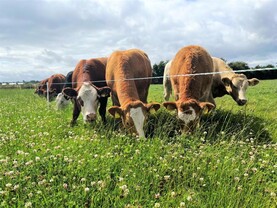It’s logical to produce more beef in Ireland, not less, favouring our environmental gift as a natural producer, leading economist David McWilliams said.
The comments came at Alltech’s 'One Ideas' conference on Wednesday, where the adjunct professor of global economics at the school of business Trinity College Dublin highlighted Ireland’s ‘permanent advantage’.
“Gulf stream and the dampness gives you a comparative advantage, and a permanent advantage over other countries. You can make stuff here which is associated with grass.
"You can make it much, much cheaper, because grass grows here all the time because of a combination of the damp climate and the relatively warm winters.
“Does it make any sense to put Ireland, as a natural producer of beef and a natural producer of certain grains, in the same boat as Estonia, northern Sweden, Spain, southern France, or Italy, which are parched during large parts of the year? No, it doesn't.”
Agtech focus
McWilliams warned that Ireland's $13bn annual food exports would cost the planet a lot more if it were to be produced elsewhere.
The Dublin-based economist advises Irish agriculture to follow in the steps of the tech sector and capitalise on breakthroughs in innovation.
“Irish agriculture could respond like Ireland's tech sector, which is home to all the big tech names, generating over $25bn in exports,” he said.
“An ultra-modern large agricultural sector mirroring the tech sector, using the most innovative technology, needs to be the focus for the country.
“It could be the cultivation of new agricultural breakthroughs, making this island the most resource-efficient, carbon-neutral, sustainable food producer on earth, something which, in turn, could produce a new export, incredibly valuable agtech.”
Futureproof industry
McWilliams predicts that agriculture will be the industry of the future, as farmers have the ability to bring the country to carbon neutrality.
“Agriculture is the only industry that can sequester carbon. Farmers talk about ecology, the environment, the weather, the soil, et cetera,” he said.
“I mean, the way in which my grandparents and their friends talked about the land and the soil and the extraordinary way in which they saw themselves as custodians meant that the harvest was actually half the discussion.
“The other half, of course, was how do we sustain everything. How do we keep everything going?
"So if you talk to farmers, they get this instinctively because the farmer understands that everything goes in cycles.”






 This is a subscriber-only article
This is a subscriber-only article










SHARING OPTIONS: